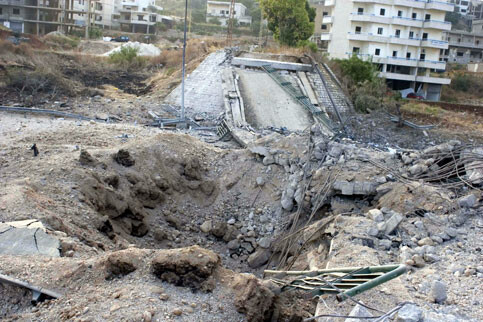Human Rights Watch 21 July 2006

Israel has been targeting civilian infrastructure such as roads in its bombing campaign on Lebanon (MaanImages/Raoul Kramer)
Israel must allow civilians safe passage out of Lebanon’s embattled south, Human Rights Watch said today. Warnings by the Israel Defense Forces (IDF) to civilians that they must evacuate southern Lebanon within 24 hours do not absolve Israel of the duty to avoid attacks likely to cause indiscriminate or disproportionate loss of civilian life.
Yesterday, the IDF advised all civilians south of the Litani River in southern Lebanon to evacuate the region within 24 hours for their own safety. Through leaflets dropped by aircraft, radio broadcasts and a recorded message to mobile phones, residents were advised not to travel on motorcycles or in vans or trucks lest they be “suspected of transporting weapons and rockets,” and become “a potential target.”
“Israel should warn people of attacks, but those warnings can’t be used to justify harming civilians who remain,” said Sarah Leah Whitson, director of the Middle East and North Africa division at Human Rights Watch. “Civilians who can’t evacuate are still fully protected by international law.”
The Israeli military’s extensive destruction over the last several days of bridges, roads and vehicles, as well as shortages of food and fuel, have made evacuation in 24 hours impossible for many. An estimated 300,000 people live south of the Litani River, which lies about 20 miles north of the Lebanon-Israel border. Some 60,000 civilians have fled the area over the past week, the Israeli newspaper Ha’aretz reported.
International humanitarian law requires armed forces to give “effective advance warning” of attacks when circumstances permit. However, even after warnings have been given, these forces must still take all feasible precautions to avoid loss of civilian life. This includes canceling an attack when it becomes apparent that the target is civilian or that the civilian loss would be disproportionate to the expected military gain.
Human Rights Watch expressed particular concern over continued air strikes that have killed and injured civilians trying to flee. On Wednesday, an air strike on a car reportedly killed four civilians: Ghassan Faqih, 31; Laila Aqil Abu Zayd Nami, 71; As’ad Habas, 42; and an unidentified fourth woman, who were driving from their village of Aitaroun to the city of Tyre.
Israeli air strikes the same day killed more than 50 people across the country, the highest daily death toll since the conflict began on July 12. Air strikes have hit civilian trucks, including those carrying sugar, flour and rice. Other attacks have destroyed public infrastructure, notably bridges and roads needed by the civilian population to flee.
“The Israeli military is telling civilians to leave, but the casualties caused by its attacks on the roads have made many people too frightened to travel,” Whitson said.
Israel’s military campaign has already displaced 500,000 Lebanese residents, or one-eighth of the country’s population, the United Nations said. The humanitarian situation is especially grim in Tyre, a few miles south of the Litani River, where an estimated 60,000 residents as well as displaced people from nearby villages are trapped with dwindling supplies of medicine and food.
The IDF announced on July 19 that it is “operating with great caution in order to prevent any harm to uninvolved civilians.” At the same time, the military said, “Southern Lebanon is a combat zone in which Hezbollah terrorists operate against Israeli civilians from within the civilian Lebanese population, using them as human shields.”
Deploying military forces within populated areas is a violation of international humanitarian law, but that does not release Israel from its obligations to take all feasible precautions to minimize harm to civilians and civilian property during military operations.
On July 19, Hezbollah fired more than 100 rockets into Israel, killing two Israeli Arab boys in Nazareth. Human Rights Watch has condemned Hezbollah for launching attacks that at best indiscriminately, and at worst deliberately, target civilians.
More than 300 people have been killed in Lebanon since the fighting began on July 12, most of them civilians. Twenty-nine Israelis have been killed, including 15 civilians.
Related Links